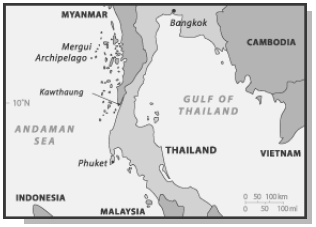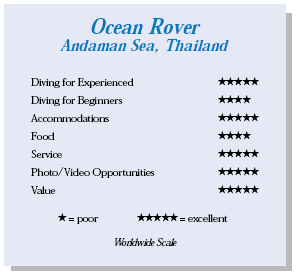Ocean Rover, Andaman Sea, ThailandContents of this Issue: What if the Burst Disk Doesn’t Burst? Ocean Rover, Andaman Sea, Thailand Luxfer Tank Trade-In Is No Bargain, But Worthwhile Is Your Live-Aboard Safe? – Part II Editorial Office: Ben Davison Publisher and Editor Undercurrent 3020 Bridgeway, Suite 102 Sausalito, CA 94965 a grand alternative in troubled times from the June, 2003 issue of Undercurrent
SARS and terrorism aren't enough to keep me from traveling the world, but I do look for less risky venues. Thailand is one of those, and with airfares at the lowest level in years, I headed for the Ocean Rover, a first-rate live-aboard that reaches exceptional diving. The Andaman Sea is its December till May itinerary -- its best, by the way -- so in March I ventured forth. First stop, after making an overnight crossing from Phuket, the Similan Islands National Park, nine densely wooded islands with gorgeous talcum powder beaches. At East of Eden, a rocky setting decorated with beautiful corals, I watched big schools of bluefin trevallies and long-nosed emperors racing through schools of baitfish. Big titan triggers were intimidating -- they can chomp down on a fin, or a leg -- and I gave them a wide berth! Purple fire dart gobies, emperor angels, big bannerfish, powder blue tangs, raccoon butterflies, an octopus walking around -- all part of the show. At Hideaway it was hard to see through the clouds of baitfish. At Christmas Point huge stacked boulders created swim-throughs -- and cold currents. I ended in blue water, but the dinghy drivers easily spotted me. At Snapper Alley, a beautiful site, I was briefly tossed about in a washing machine but managed to see a giant moray, batfish, razorfish, schools of white collar butterflies, black and white pyramid butterflies, spotted rabbitfish with bright yellow tail spots, and another octopus. At Ko Bon, there were big schools of snappers, and a manta ray fluttered by. Huge lionfish floated listlessly, and two banded sea snakes -- kraits -- undulated gracefully along the reefs, past sweetlips with such wide, square mouths that they could have been called "shovel nose." And we had yet to reach the best diving!
The 100-foot, three-year-old craft, with a cruising speed of 10 knots, was built by local labor, including that of its crew. With a naval architect, they designed a boat especially suited for Thailand's remote waters. Comfortable and safe, the Rover conforms to international maritime standards. The 12 crew members are proud of their work -- the engine room is as spic and span as the rest of the boat. This is my 10th live-aboard, and it wins the prize for comfort and service. She has eight cabins with ensuite bathrooms -- hair dryers and toiletries are furnished -- and individually controlled air-conditioning. Each has a nearly queen-sized bed with a top single bunk and ample storage space. Pretty Thai hostesses Pannee and Panthip care for the cabins and change towels whenever you leave them on the floor. Soundproofing meant I was never bothered by next door neighbors or late night revelry. Most divers were from America, including an expat living in the Philippines, another in Saudi Arabia, an Irishman living in London, and another man living in the south of France. The water (and often the air) was a warm 86 degrees, except for an occasional thermocline. Dives were limited to an hour, so we could get in all our five daily/nightly dives. Mark asked us to take five-minute safety stops and stay five minutes out of deco, as the nearest chamber is up to 20 hours away, with no airlift available. Aluminum 80s, pumped to 3,000+, were arranged in racks behind benches, with an accessory basket underneath each station. I dived Nitrox at $100 extra (Mark said that they hadn't had an accident since they added Nitrox). Hoses were available for showers, with warm towels after every dive. Facilities for photographers were excellent ... E-6 slide processing ... light tables ... huge rinse tanks ... multiple camera tables ... several 220V and 110V plugs. An open-air sundeck has lounge chairs and shade. Plenty of water, soft drinks, coffee, tea, hot chocolate, cookies, crackers, and candy were handy. Beer and wine could be purchased by the honor system, and between dives they served us freshly baked snacks. The indoor areas had small sofas, two large dining tables, and plenty of space for working on cameras. Audio and video entertainment centers were often used. Many reference books helped us identify fish, and the paperback library was well stocked. Email service was also available -- I got word of the birth of a grandson during the trip! To dive, one steps down to the spacious "Whaledeck" and climbs into one of two fast chase boats. The crew carries tanks, hands down cameras, and even helps with fins. Within a day or two, they knew everyone's name and equipment. They helped us kit up, rinsed our masks, made sure we had our weight belts on, and put our fins in the right dinghy for us. The boats have boarding ladders (which needed another rung) and when we returned from a dive we handed up gear before climbing in. On the mother ship, they washed our gear, rinsed and hung our wetsuits -- always with a wide smile -- and even sewed up tears in wetsuits! They didn't speak much English, but then I don't speak Thai. (I did learn to say "thank you" in Thai, which brought forth even broader grins.) The famed Richelieu Rock
was busy with several dive
boats, so we were in the water
before 7 a.m. During three
dives here, I was impressed
with the white and purple soft
corals covering the rocks.
Huge schools of snappers
cruised around. A pair of
orange and white spotted
harlequin shrimp munched on a
starfish leg. Mark told us
that these small shrimp can
even overcome a crown-ofthorns.
I saw unusual redbarred
anthias, a spindle cowrie on a sea fan, a big boxer mantis
shrimp, two starry dragonets, a
hawksbill turtle, and a Jan's pipefish.
Right under the surface were "Long
Toms," big needlefish. Next stop Myanmar (Burma) and the border town of Kawthaung. Customs officials came out to check our passports and to collect the $150 entry fee (in crisp new bills!), and then a representative joined us for the duration. We headed to the Mergui Archipelago, eating dinner along the way. The cook did a great job with Thai food, spicing it to meet the needs of the guests. We always had rice and iceberg lettuce salad. We enjoyed fresh fish, beef stir fry, and other chicken and pork dishes. Often there were stir-fried veggies and always delicious fresh fruit. Desserts were apple pie and ice cream, chocolate cake, blueberry cheesecake -- and two birthday cakes, decorated with carrot and cantaloupe fish! Seating was tight, as the two long tables don't have much space in between. Pan, one of two hostesses, was quick to refill plates or drinks. Lunches might be hotdogs, cheeseburgers, and pizzas, along with the usual Thai dishes. Fried shrimp and French fries were popular, as were chicken curry, noodles with meat sauce, chicken cordon bleu, and egg rolls. Salad and fruit were always on the buffet. Breakfasts included croissants, toast, bacon, eggs, cereal, pancakes, yogurt, fruit, and juice. We voted not to go to the Burma Banks, as the sharks are not now as frequently seen. So we dived the island Western Rocky, in open sea, surrounded by submerged pinnacles. With great visibility and light, I watched the plain colored cuttlefish laying her eggs, guarded by a male she had earlier mated with, beautifully striped in black and white, with a neon stripe running around his body. A smaller male waited for a turn. Mark pointed out golden wentletrap snails trailing yellow egg batches and each inserting a proboscis into, and thereby eating, yellow cup corals; tiny hairy orangutan crabs; two fat, pink, orange spotted nudibranchs; Halgerda stricklandi, named for Mark, as he was the first to find them; harlequin ghost pipefish; an adhesive anemone with porcelain crabs; and popcorn and eggshell shrimp. I entered a cavern whose walls were covered with huge lobsters, though obscured by clouds of glassy sweepers. Many scorpionfish sat on the rocks. Outside I was entertained by a big school of beautiful flasher (or filament) wrasses, extending dorsal and anal fins for a bright show of color, and I had a peek at a yellow fimbriated eel. So many remarkable and unusual critters! Overnight we cruised to Black Rock, which was covered with soft coral and cup corals. Here I saw the trip's first sharks -- a leopard and a whitetip -- a group of blackfin barracudas, and silvery pompanos. Snappers, emperors, and jacks were slashing through clouds of greenish baitfish. Two scrawled filefish chomped down on a big jellyfish, and painted spiny lobster antennae stuck out of cracks all along the wall. Swirling surge knocked my knee into a big black spiny urchin. After the dive I treated what looked like a big, black, and bleeding tattoo with lime juice and antibiotic ointment. At Three Islets I descended through a tunnel carpeted in bright yellow sponges, with a big marbled ray swimming around. Over the sand were lots of 12- inch pipefish and a squadron of squids. During four dives here I found a white harlequin ghost pipefish and two big tiger tail seahorses. Rocky Islet was a madhouse. Thousands, maybe millions, of small fish raced helter skelter, flashing streaks of silver and yellow. A fimbriated eel was waving his head out of his hole and snapping at the swirling fish. The only stationary thing was a stonefish on the sand! I passed over a beautiful stretch of bright red anemones, looking like they had light bulbs inside them. High Rock had a tiger tail seahorse tucked into a fan, as well as more frogfish and cuttlefish. Beautiful lunar wrasses were gobbling eggs laid by damsels, while a sea krait was hunting amid the rocks. The last dive had wild currents, with visibility further limited by a "sandstorm." Finally, we returned to Kawthaung and went into town for a few Myanmar beers at the Moby Dick. A dirty and poor town, but the people were friendly and smiling. We returned to Richelieu Rock for easy dives with great visibility. At the Bang Sak wreck, I watched a devil scorpionfish lumber around, seeming barely able to move on his pecs. Big porcupine puffers schooled here and reef fish were everywhere. That night we returned to the Similans for our last dives. Starting at Elephant's Head, I descended into a thermocline of what felt like ice water. Fortunately I passed through it and saw two whitetips and a big hawksbill turtle. A big school of blue fin and giant trevallies, emperors, and mackerel cruised around - - then at some invisible signal suddenly zoomed off and crunched through a cloud of baitfish. East of Eden seemed like a casual stroll through a garden, with perfect vis and light. Morning Glory, site of our first and last dives, was similar, with fish everywhere, including a Picasso trigger, bird wrasses, and Indian bannerfish, who appear to have long eyelashes. So many fish that my head was swimming. So Thailand, with the right boat -- and the Ocean Rover is the right boat, is a great venue, among the safer in these troubled times, with diving just short of spectacular. I didn't see a whale shark. Or parades of sharks or eagle rays or mantas. Many dive sites were barren limestone outcroppings -- not paradisiacal islands. But, my, what a fish life. And what a boat and crew. - K.I.
|

I want to get all the stories! Tell me how I can become an Undercurrent Online Member and get online access to all the articles of Undercurrent as well as thousands of first hand reports on dive operations world-wide
| Home | Online Members Area | My Account |
Login
|
Join
|
| Travel Index |
Dive Resort & Liveaboard Reviews
|
Featured Reports
|
Recent
Issues
|
Back Issues
|
|
Dive Gear
Index
|
Health/Safety Index
|
Environment & Misc.
Index
|
Seasonal Planner
|
Blogs
|
Free Articles
|
Book Picks
|
News
|
|
Special Offers
|
RSS
|
FAQ
|
About Us
|
Contact Us
|
Links
|
3020 Bridgeway, Ste 102, Sausalito, Ca 94965
All rights reserved.

 Mark Strickland, whose knowledge of fish and reefs and photography runs deeper
than you can dive, operates the Ocean Rover. Diving in Thailand
since 1987, he is the principal
author and photographer of "Scuba
Guide Thailand (Asian Diver)" and
coauthor of Lonely Planet's new
"Diving and Snorkeling Thailand."
Mark's enthusiasm was catching, and
he was always happy to share his
expertise. He told us what we
would see and where to look -- and
he or sharp-eyed divemaster Hans
Tibboel was with us on every dive
to point out the critters.
Mark Strickland, whose knowledge of fish and reefs and photography runs deeper
than you can dive, operates the Ocean Rover. Diving in Thailand
since 1987, he is the principal
author and photographer of "Scuba
Guide Thailand (Asian Diver)" and
coauthor of Lonely Planet's new
"Diving and Snorkeling Thailand."
Mark's enthusiasm was catching, and
he was always happy to share his
expertise. He told us what we
would see and where to look -- and
he or sharp-eyed divemaster Hans
Tibboel was with us on every dive
to point out the critters. I spotted a
bright orange frogfish, or clown angler
fish, a difficult find despite the
loud coloration. A gray cuttlefish
was laying eggs in a hole while a
darker striped male guarded her as she
patiently transferred the eggs to her
tentacles and stashed them away.
Anemones were everywhere, with many
varieties of clown fish, including a
red saddle anemone fish in a light
bulb anemone. Hundreds of hingebeak
shrimp covered the rocks, reminding me
unpleasantly of cockroaches. Cleaner
shrimp groomed a big grouper and a
giant moray. In the distance a school
of pick handle barracudas passed by.
White eyed morays, often out in the daytime, were all over the reef. One continually
stuck his head into holes in his path, his tail frantically thrashing about.
I spotted a
bright orange frogfish, or clown angler
fish, a difficult find despite the
loud coloration. A gray cuttlefish
was laying eggs in a hole while a
darker striped male guarded her as she
patiently transferred the eggs to her
tentacles and stashed them away.
Anemones were everywhere, with many
varieties of clown fish, including a
red saddle anemone fish in a light
bulb anemone. Hundreds of hingebeak
shrimp covered the rocks, reminding me
unpleasantly of cockroaches. Cleaner
shrimp groomed a big grouper and a
giant moray. In the distance a school
of pick handle barracudas passed by.
White eyed morays, often out in the daytime, were all over the reef. One continually
stuck his head into holes in his path, his tail frantically thrashing about. Diver's Compass: Ocean Rover, 10 nights upper double cabin
including all meals, all diving, and round trip transfers to the
boat, $2790, plus Burma entry fee of $150,
Diver's Compass: Ocean Rover, 10 nights upper double cabin
including all meals, all diving, and round trip transfers to the
boat, $2790, plus Burma entry fee of $150, 